Kids ask so many freaking questions! I have found myself in so many awkward situations because I wasn't exactly sure of the most appropriate way to explain certain things to a child. My veganism is one of those tricky subjects. I think kids should know where food comes from and that some of it may have come from an animal, but I don't think it's ok to scare kids into veganism, and it's inappropriate to step on another parent's toes. However, kids ask questions because they need to understand their world and the different kinds of people that they share it with, vegans and meat-eaters alike.
This book is one great way to tackle that scary question, "What's a vegan?" It's a wonderful book about vegetarianism for kids. It's a very gentle and un-scary way to explain what veganism is and why some people don't eat animals. The illustrations are very sweet, depicting happy animals in natural settings and sad animals in factory farms. I also have to say that, as an adult, I still enjoyed this book for myself and managed to learn a few things from it. Did you know that a heard of cows will all moo together until a missing member finds its way home? I didn't.
Now, don't even ask me where to begin when a kid wants to know where babies come from. Go ask your mother.
Friday, April 16, 2010
Tuesday, April 6, 2010
Let the Great World Spin by Colum McCann
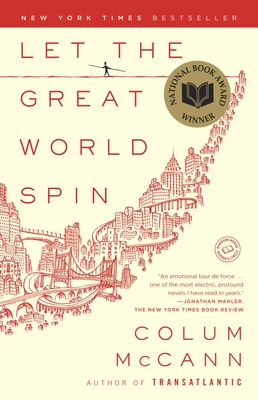 I've always been captivated by stories of New York in the 70's and 80's, back when it was still a dangerous and trashy city, when Times Square was all smut and crime, without the Disney musicals. Let the Great World Spin takes place in that era. It has all the dirt and grime, but it is a story about people, so it also has their hope. The stories move between the South Bronx, the Upper East Side and the Financial District (the southern tip of Manhattan).
I've always been captivated by stories of New York in the 70's and 80's, back when it was still a dangerous and trashy city, when Times Square was all smut and crime, without the Disney musicals. Let the Great World Spin takes place in that era. It has all the dirt and grime, but it is a story about people, so it also has their hope. The stories move between the South Bronx, the Upper East Side and the Financial District (the southern tip of Manhattan). The book takes the stories of many different people, from all parts of life, and weaves them together slowly and delicately. Most of them do not even know they are connected; they may sense it, but they will never fully understand it. An Irish priest and his brother, living in the South Bronx, one to find the underworld, the other trying to get out of it, become entangled in the lives of a group of prostitutes. A rich mother loses her only son in Vietnam and tries to find other mothers to connect with. A lost artist gets into a car accident that will change the course of all of their lives and set the story fully in motion.
The stories are all fictional, but they have something very important, and completely true, in common. In 1974 Phillipe Petit strung a wire between the Twin Towers and by walking across it he created an instant network of people, all connected by the same miraculous moment. Petit created one more piece of web to connect all of these stories. At the very height of their stories, the climactic turning point, they all experience the man dancing on the wire between the Twin Towers. His 140 foot length of cable, somehow crossed over the entire city at once, From the South Bronx, to the Upper East Side and back to the Financial District.
I loved this book. It's definitely a must-read for any fiction lovers.
Sunday, March 14, 2010
Eaarth by Bill McKibbon
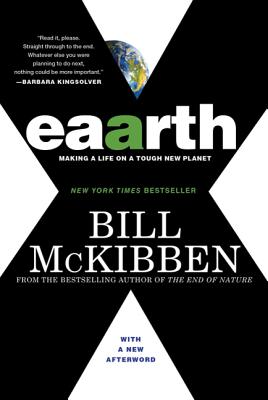 If it were up to me I'd make this book required reading for everyone on the planet. It's one of the most important books ever written about climate change. In fact, the only reason it's not the most important book, is because books written in the 70's and 80's predicting climate change were far more important, though mostly ignored. If we had only listened then, we would need a book like Eaarth now.
If it were up to me I'd make this book required reading for everyone on the planet. It's one of the most important books ever written about climate change. In fact, the only reason it's not the most important book, is because books written in the 70's and 80's predicting climate change were far more important, though mostly ignored. If we had only listened then, we would need a book like Eaarth now.The book starts strong. It caught my attention quickly, citing specific examples of climate change and it's results on both massive and small scales. I thought the reason the United States didn't take much interest in climate change was because those hardest hit by changes in the weather lived in other parts of the world, but the truth is, we've been hit too. The major difference is that American people, supported by the US government, have the money to import food, crank up the AC and even pack up and move if we want. However, at the rate we're going, we're going to reach a point where all the money in the world won't be able to buy you food that just won't grow, or remove the pollution from your water, or save your life when a hurricane crashes into your town.
But the book isn't all doom and gloom. McKibben simply wants to make sure you're listening. He wants you to know that you're not saving your children or your grandchildren anymore, you're saving yourself. He wants you to you fully understand that the planet has been fundamentally changed and it's not ever going to change back. The most we can do is stop things from getting worse. It's a really hard piece of information to swallow.
The second part of the book is more hopeful. McKibben doesn't have all of the answers to survival, but the ideas he has are really good ones. His points are valid. I really liked his idea of communities providing for themselves and looking out for each other. Why buy your electricity from a power plant when you can generate it yourself? There's real security in being able to take care of yourself. When oil starts to dwindle and the prices skyrocket why not power your electric car and your house at the same time with solar and wind power from your own yard? His point is that we can't wait for big government to save us and provide for us, we have to show them what we want. With the world in the state is in right now, bigger is not going to be better. We have to scale down, start taking back the power to care for ourselves.
McKibbon isn't attacking the government. He praises large scale projects like highways and general infrastructure. This country grew and grew and because of that, American people enjoy a fairly high standard of living. It's time to stop growing though. It's time to adapt to the world we created. No book I've yet read makes that more abundantly clear than Eaarth.
It ends on a good note. The kind of ending that makes it easier to recommend this book. He uses Vermont as a model for sustainability, but he talks about larger-scale projects as well; things that are working. He also points out the importance of the internet. The internet, this crazy tool that can connect anyone, anywhere. For example, I'm writing this review while sitting on a bus to NYC. The wireless internet connects me to millions of people, the biggest forum ever known. Any idea I'll ever have can instantly be shared with he world. There is no need for us all to be isolated, we can figure out solutions and move forward as a group. I can instantly find information about powering my own home, growing my own food, and converting my car to run on veggie oil by just getting online. The limitless connections of the internet are a gift when most of us don't even know our own neighbors. It's a hope, in a world where hope fades more and more the longer we live the way we do.
And, in the interest of saving paper, I will gladly loan you my copy.
Friday, February 19, 2010
Wicked Plants - Amy Stewart
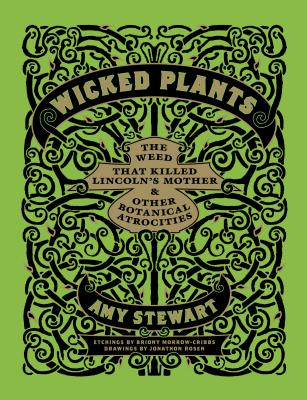 What a charming and interesting book. I had no idea that so many common plants were so freaking bad for me and might possibly be able to kill me or my cat (this is imagining that I have a cat of course). For instance, did you know that tulip bulbs can cause blisters on the hands of people who package them because they are slightly poisonous? I mean, I always knew that tulips could inspire murder and ruin economies, but blisters? Now that's crazy!
What a charming and interesting book. I had no idea that so many common plants were so freaking bad for me and might possibly be able to kill me or my cat (this is imagining that I have a cat of course). For instance, did you know that tulip bulbs can cause blisters on the hands of people who package them because they are slightly poisonous? I mean, I always knew that tulips could inspire murder and ruin economies, but blisters? Now that's crazy!The book isn't all poison though. It also highlights plants that are destructive, and illegal, intoxicating, unpleasant, and dangerous. Apparently Stewart's opinion is that tobacco is the most dangerous plant of all. I'd have to say I agree with her on that one, though the Australian Stinging Tree sounds excruciating.
There were so many little tid bits about the plants I see every day or even keep in my house. The book isn't set up in a way that is meant to be shocking or scary; it's interesting and fun. The author includes fun little facts and stories about most of the plants, which makes it more fun to read. It's also such a nice size and comes with a ribbons attached to use as a book mark. Why don't all hardcover book come with ribbons damn it?
I had mixed feelings about the art in the book. The etchings, done by Briony Morrow-Cribbs, were very well done and interesting. They were beautiful and eerie at the same time, very much in the spirit of the book as a whole. They also remind me of the art my friend Lisa does, which helps. However, the little illustrations, done by Jonathon Rosen, were so poor that they actually annoyed me. They look like hasty doodles. I actually checked out his website because his bio in the book had some impressive commissions. His work varies from the doodly things seen in this book, to some impressive illustrations for newspapers and magazines. Go figure.
Basically, when I was done reading this book, I wished there was a poison garden somewhere around here to visit. I have such a new appreciation for the scary power of the plant world. I always knew dangerous plants existed, but I guess I didn't realize just how common they were, and just how dangerous they could be.
Monday, February 1, 2010
Generation A by Douglas Coupland
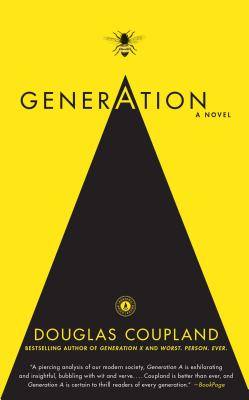 Douglas Coupland's writing is a little Chuck Palahniuk, without trying as hard to be clever, and a little Kurt Vonnegut, though not so cynical. This book is not his first novel, but it almost reads like one. It doesn't make me interested to read his other books anytime soon, which is a bummer because I had high hopes for this book.
Douglas Coupland's writing is a little Chuck Palahniuk, without trying as hard to be clever, and a little Kurt Vonnegut, though not so cynical. This book is not his first novel, but it almost reads like one. It doesn't make me interested to read his other books anytime soon, which is a bummer because I had high hopes for this book.The story is about the foreseeable future when bees have gone extinct. No one has seen them for at least five years. Suddenly 5 different and seemingly unrelated people get stung. The book is told from their individual perspectives. Coupland does a good job of giving them all different personalities, though the writing style for each voice is basically identical. I found myself having trouble believing that the perceptive introvert was perceptive at all in certain chapters. At times he told his story like an ignorant fool.
I had bigger problem with the pacing. The story was all beginning and end, with no middle to speak of. We start out with the 5 people getting stung and they are whisked away to underground labs to be studied for a month, without explanation as to why. Then they go home, but before anything can happen there, they are whisked away yet again to a remote island where they find out why they were stung and what the results of being locked away underground were. Why even have them go home at all? Coupland seemed to be in a rush, but nothing gets me into a book like a writer who savors the story.
But I don't want to be misleading, it's a fun book and Coupland has a smart writing style. It was an easy read and an enjoyable one. It simply wasn't my favorite and I won't be rushing to re-read this book. I still stand by it being an interesting story idea, I just wish there could have been more to it. In a way that's a compliment. It's not like I didn't finish the book; I liked it enough to want more from it.
Monday, January 18, 2010
Vegan Freak by Bob and Jenna Torres
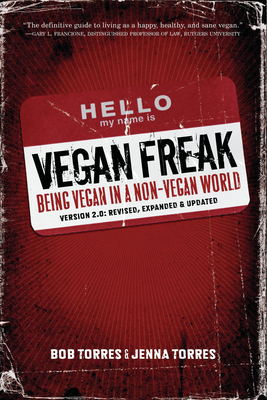 This book is a must have for any vegans, vegetarians, or people somewhere in between. It's kind of a how-to guide to surviving in a very non-vegan world, where you will probably be looked at as a freak.
This book is a must have for any vegans, vegetarians, or people somewhere in between. It's kind of a how-to guide to surviving in a very non-vegan world, where you will probably be looked at as a freak. It deals with the obvious question of "why vegan?" and also the less obvious question of "why vegan and NOT vegetarian?" It also deals with the parts of veganism that involve non-food items. I especially like the chapters about how to handle non-vegans, specifically family and friends.
I really identify with and needed something like this book. It explains the importance of having vegans friends and a vegan community. I live in a small town and I'm lucky to know even one other vegan. I spend a lot of time reading vegan blogs and I communicate with my vegan friends in NY whenever I feel like I need a vegan ally. Part of the reason I have this blog is for and outlet for my life and my veganism is part of that. It's frustrating to feel like you're the only person around who sees the very serious cruelty involved in the non-vegan ways of the people around us, especially the people we love.
The only major criticism I have about this book is the editing. In this case, it seems like the major part of the editing process was done by a spell checker and not much more. I found so many major grammatical errors in this book it drove me mad. Simply sending the book to anyone else and having them read it cover to cover would have solved so many of the editing issues. Oh my god I have never read a book with so many typos. Even my college papers had less problems than this book. Bob and Jenna, if you're reading this, I adore you guys, but please fix this stuff before the next printing. (For all you people out there who would argue that my own blog is full of errors, I'll remind you that I openly admit to not proofreading mot of this, it's not a published book, and I make absolutely no money from it. It's a hobby, not a job and is in no way professional.)
I don't want to make the book sound amateur, it's not. It's so clear that a lot of thought and research went into it. They include many other books to refer to for more information and help on any of the many topics they touch on in the book. It's a starting point, and an important one. So, if you're vegan, or thinking about it: go buy this book! Or borrow it, whatever.
Wednesday, January 13, 2010
Sleeping Naked is Green by Vanessa Farquharson
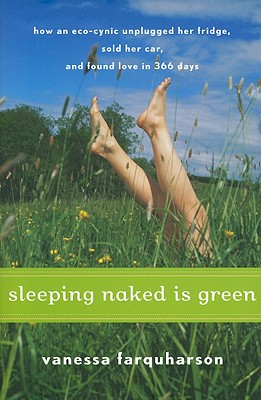 Vanessa Farquharson is a movie critic for the Canadian newspaper National Post and doesn't care too much about the environment, until she sees "An Inconvenient Truth," and finally feels that she needs to do something. But what? She decides to take on a challenge of making one green change in her life every day for a year.
Vanessa Farquharson is a movie critic for the Canadian newspaper National Post and doesn't care too much about the environment, until she sees "An Inconvenient Truth," and finally feels that she needs to do something. But what? She decides to take on a challenge of making one green change in her life every day for a year.The book is divided into chapters by month and each month starts with a list of the changes she made each day. It starts out simply: Changing to recycled paper towels. But she soon starts to become desperate and shuts off her freezer, then her fridge. The order in which she makes her changes is... well, odd to say the least. For example, she turns off her fridge before putting a brick into her toilet tank. She gives up toilet paper before she gives up her vacuum. She also waits until day 198 to sign up for CSA.
She soon finds that being just a little green suddenly makes her want to be as green as possible. She wants to be the greenest in the green movement and often finds herself jealous and competitive of other environmentalists. At the same time she struggles with frustration over making certain changes and exhaustion from having to think new ones up. Some might be seen as a cop-out (writing only haiku poetry, signing up and then promptly taking down her profile on greensingles.com) but you have to give her credit and cut her some slack, she's making 366 (leap year) changes.
She whines endlessly about how hard it is to be an environmentalist, but when it comes time for her challenge to end, she keeps almost all of her green changes. This book is just further proof that anyone who is educated about the changes they can make and why they should make them (not to mention how easy it can often be), will make them. And they will start to care about it too. It's easy to claim ignorance about the environment and do nothing, but once you do know, it's harder to forget. She even manages to green her family a little, even though they were adamantly against environmentalism at the start.
This book is inspiring. And funny. And down to earth. Plus it's a great read. It's good information for environmentalists or just people curious at where to start. The green movement is often seen as either too extreme or just not enough, but Farquharson struggles to find a middle ground. Reading this book made it more apparent to me just how easy it could be to step up my own greening. It's nice to see all of her changes in a list in each chapter, because although she doesn't talk about each one, you still know what kinds of changes she is making.
Because Farquharson is a journalist, her writing is interesting and engaging. She talks about the changes and why she made them, but also what the result is on her life as a a whole. Not to mention she's hilarious. The book isn't just a list of changes that you can make, it's a story about making a difference. At the end Farquharson isn't a preachy environmentalist. She sticks with her own changes, because she sees no point in going back. But there's no denying that the story is an inspiration to those who read it. It's a story about how little changes can make a big difference, not just to the Earth, but to your entire life.
Monday, January 11, 2010
The Count of Monte Cristo by Alexandre Dumas
 I can't review this book. How could I review this book? I feel like a fraud. What right do I have to write anything about this amazing story? It's a classic for a reason! It's so perfect and meticulous. Dumas created the most amazing and perfect characters and had no trouble whatsoever bringing them to life. There's not a speck of laziness in his writing. He takes no shortcuts, creates no miracles without explanation, and he runs the reader through every possible emotion throughout the story.
I can't review this book. How could I review this book? I feel like a fraud. What right do I have to write anything about this amazing story? It's a classic for a reason! It's so perfect and meticulous. Dumas created the most amazing and perfect characters and had no trouble whatsoever bringing them to life. There's not a speck of laziness in his writing. He takes no shortcuts, creates no miracles without explanation, and he runs the reader through every possible emotion throughout the story.Edmond Dantes is wonderful. He's an honest and good person and he's perfect in so many ways. If he's slightly conceited, it is only because he is too young to know any better. When he becomes the Count of Monte Cristo he is conceited because he has learned to know better. He is the ultimate instrument of revenge and wrath. He is so perfect and adept at his revenge that at times it gets away from him, it takes on it's own life. He forgets that he is human and I found myself forgetting as well. However, Dumas reminds his readers before he reminds The Count. We see what is about to unfold just before Dantes and just after it is too late to stop any of it. The revenge is so perfectly plotted, no detail is left out. However, it is impossible to know the full extent of it, only because it impossible to know any person to the fullest extent. Who knows just how far any one character will go? No one but Dumas it seems.
The ending. Oh the ending. Of course I would never reveal the ending. But, oh is it perfect. Amazing. A believable fantasy, just like the rest of the book, but somehow even more so. And just like the rest of the book it is impossible to say just what happens after the last page. The story will never rest, because, like life, there are no tidy endings. Like life, you can never really know what path people will choose, or what tomorrow will bring.
Subscribe to:
Posts (Atom)
